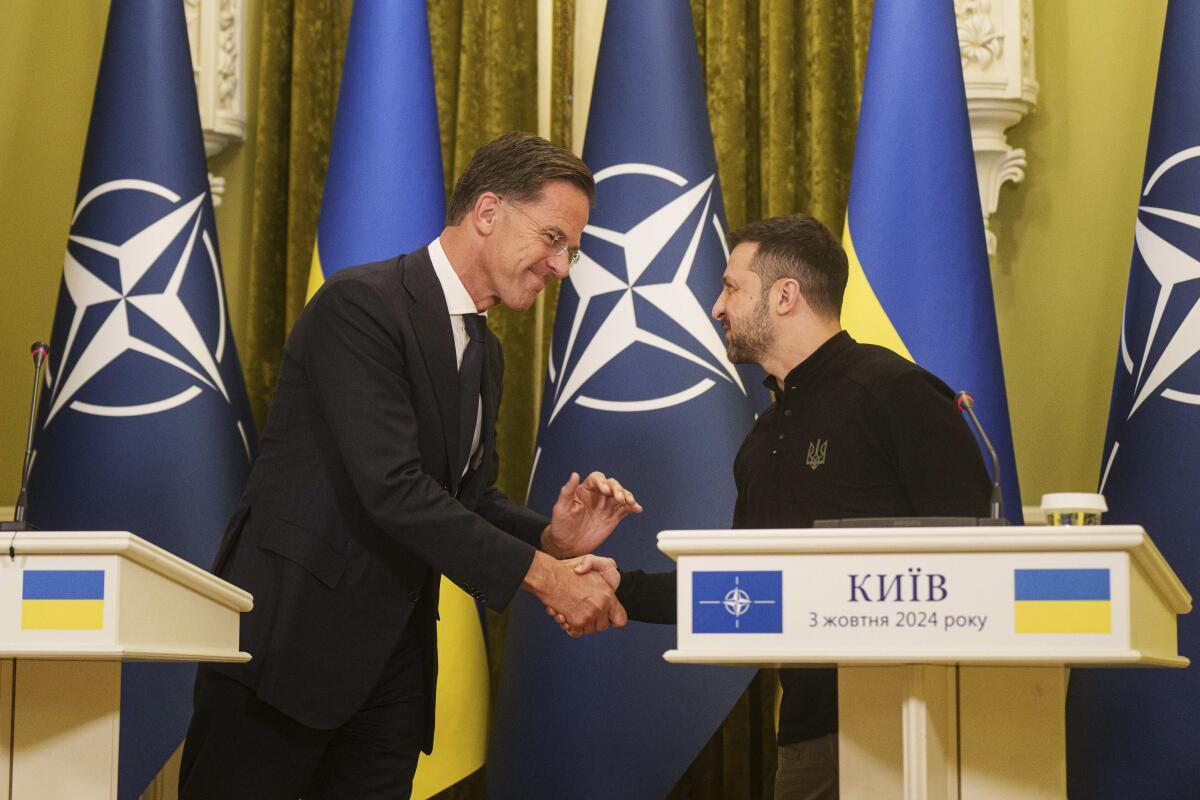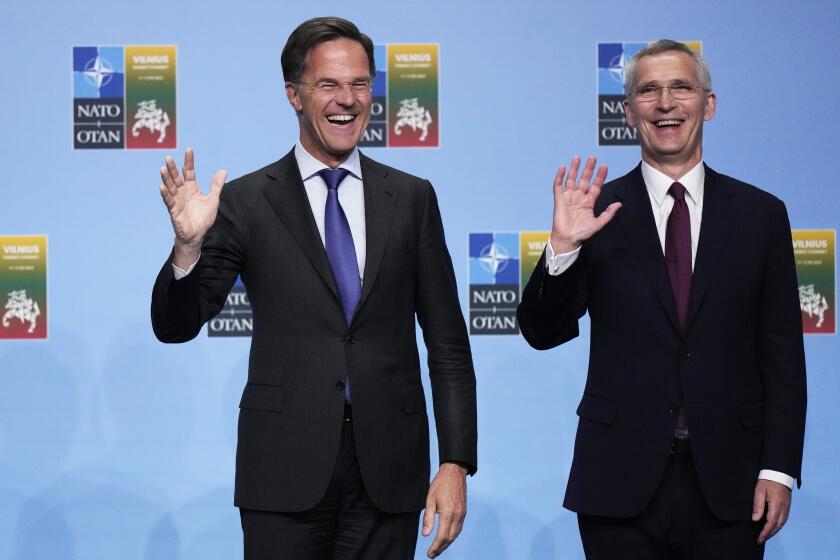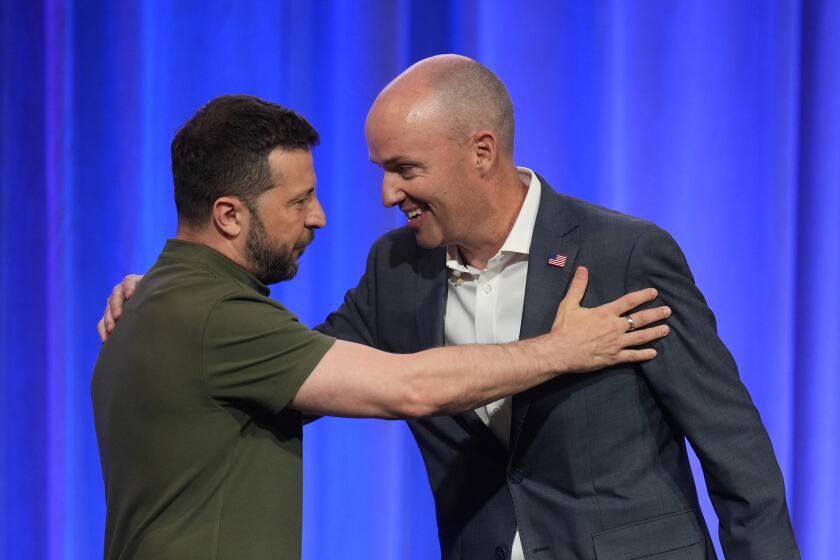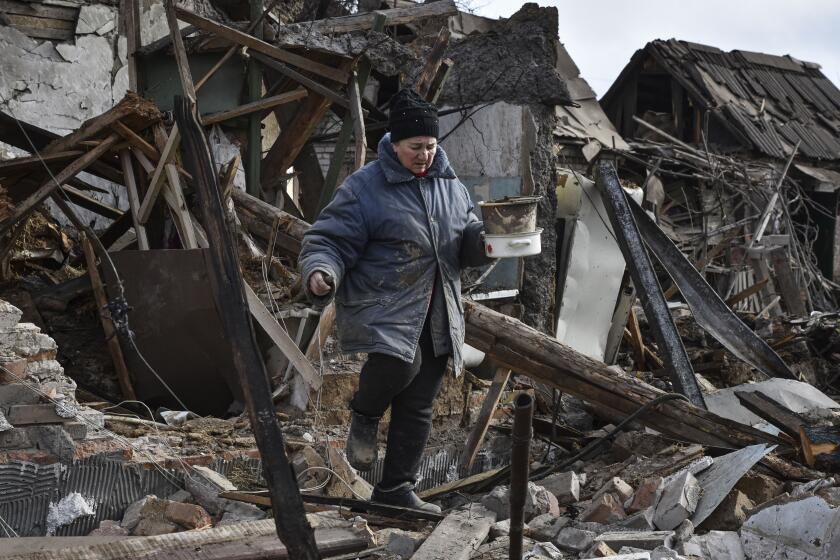New NATO chief Mark Rutte visits Ukraine two days after taking office

- Share via
KYIV, Ukraine — New NATO Secretary-General Mark Rutte visited Ukraine on Thursday in his first official trip since taking office and pledging the alliance’s continued support for Kyiv in its war with Russia.
Rutte met with Ukrainian President Volodymyr Zelensky in Kyiv as air raid sirens twice went off in the Ukrainian capital.
The new head of the North Atlantic Treaty Organization vowed when he took office Tuesday to help shore up Western support for Ukraine, which has been fighting Russia’s full-scale invasion since February 2022 and has for most of this year been on the defensive against a relentless Russian army push in the country’s eastern regions.
Rutte expressed confidence that he can work with whomever is elected president of the United States, the alliance’s most powerful member, in November. That could be a key moment for Ukraine’s effort to ensure continuing Western support.
Zelensky said he discussed with Rutte elements of Ukraine’s so-called victory plan, ahead of a NATO meeting at the Ramstein Air Base in Germany next week. The gathering draws together defense leaders from the 50-plus partner nations who regularly meet to coordinate weapons aid for the war.
The two also discussed the battlefield situation and the specific needs of Ukrainian military units. Zelensky reiterated that Ukraine needs more armaments, including long-range weapons it has long requested.
Mark Rutte knows a thing or two about finding consensus among fractious coalition partners
Asked whether the war in the Middle East will affect the timeline he had envisioned for the victory plan, Zelensky noted that the U.S. and Britain say Iran has supplied missiles and drones to Russia for use against Ukraine.
He also appealed for Western countries to scrap restrictions on Ukraine’s use of Western-supplied long-range weapons to strike deep inside Russia.
“Of course, we want Ukraine to not be forgotten. But the best way not to forget about Ukraine is to provide the appropriate weapons and the necessary permissions,” Zelensky said. “And to help shoot down ... the same Iranian missiles or drones, just as they are shot down over Israel, to shoot them down in the same way over Ukraine.”
Rutte reiterated the alliance’s unwavering support for Ukraine, insisting that “Ukraine is closer to NATO than ever before.”
He said recent steps taken by the alliance “build a bridge to NATO membership” for Ukraine, including 40 billion euros — about $44 billion — in funding assistance, bilateral security agreements between allies, and the formation of a new NATO command to coordinate assistance and training.
Rutte arrived after a Russian glide bomb struck a five-story apartment block in Kharkiv, Ukraine’s second-largest city, injuring at least 12 people, including a 3-year-old girl, local officials said Thursday.
Ukrainian President Volodymyr Zelensky is seeking to broaden support outside Washington.
The bomb struck Wednesday night, igniting a fire, Kharkiv regional Gov. Oleh Sinegubov said. Firefighters searched for survivors through smoke and rubble.
The city of Kharkiv, about 18 miles from the Russian border, has been a frequent target of aerial attacks throughout the war.
Increasingly common in the war, glide bombs have terrorized civilians and bludgeoned the Ukrainian army’s front-line defenses. Ukraine has no effective countermeasure for glide bombs, which are launched from Russian aircraft inside Russia.
They were a key weapon in Russia’s capture of the tactically significant town of Vuhledar on Wednesday, as Russian forces wreak destruction on the eastern Donetsk region and force weary Ukrainian troops to withdraw from obliterated towns and villages.
Zelensky, at a news conference with Rutte, said it was right for Ukraine to pull its forces out of Vuhledar so that they could live to fight another day. Earlier, he said the latest Kharkiv attack highlighted the urgent need for increased support from Ukraine’s Western allies.
Vladimir Putin has scoffed at the possibility of Russia launching an attack on a NATO member. Still, he says Western bases hosting Ukraine F-16s would be targets.
Zelensky recently held talks with officials in the U.S. to seek further Western military support.
Russia has had the battlefield initiative since late last year, when a Ukrainian counteroffensive petered out. Ukraine is grappling with a critical manpower problem on the front line and is straining to hold back Russia’s grinding assaults.
Though Russia’s battlefield gains have been incremental, its steady forward movement is adding up as the Ukrainians are pushed backward and yield ground.
Both sides have kept up regular cross-border aerial attacks, usually at night.
Ukraine’s air force said Thursday that 78 out of 105 Shahed drones launched by Russia overnight were destroyed as 15 regions of the country came under attack.
The Russian military, meanwhile, intercepted 113 Ukrainian drones overnight, according to a statement by the Defense Ministry in Moscow. The drones were destroyed over four Russian regions on the border with Ukraine — Belgorod, Bryansk, Kursk and Voronezh, it said.
Arhirova and Kullab write for the Associated Press.
More to Read
Sign up for Essential California
The most important California stories and recommendations in your inbox every morning.
You may occasionally receive promotional content from the Los Angeles Times.













